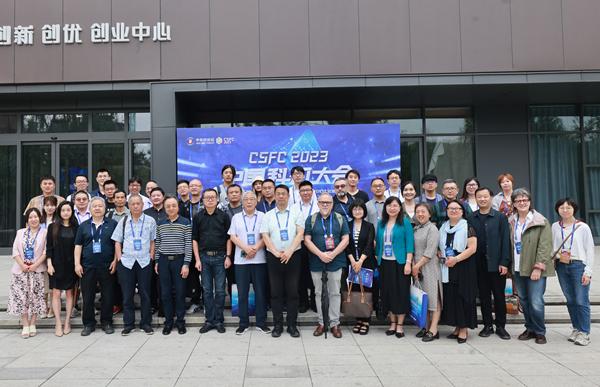
The 6th annual meeting and academic forum of a science fiction creation and research base took place on Tuesday in Beijing, convening prominent writers and professionals looking to boost China's sci-fi

Participants of the annual conference of the China Science Writers Association's (CSWA) Science Fiction Creation and Research Base and the Academic Forum of Science Fiction Works pose for a group photo after the meeting during the China Science Fiction Convention in Beijing, May 30, 2023. [Photo courtesy of Beijing Yuanyu Science Fiction and Future Technology Research Institute]
The annual conference of the China Science Writers Association's (CSWA) Science Fiction Creation and Research Base, along with the Academic Forum of Science Fiction Works, was held during the China Science Fiction Convention 2023. The event saw the participation of over 70 experts, writers, editors, entrepreneurs and professionals from the sci-fi sector and associated industries, including acclaimed writers Liu Cixin, Wang Jinkang and Francesco Verso.
At the meeting, Wang Weiying, the base's deputy director and secretary-general, provided a summary of the base's achievements in 2022 and outlined the work plan for the upcoming year. She covered areas such as sci-fi book publishing, research and academic exchanges, industrial transformation, and education and talent development in the sci-fi field. She delineated the next steps and stressed that the base would continue its endeavors in creation, research, publishing, international exchanges, and promotional activities throughout the year.
Liu Cixin, a prominent Chinese sci-fi writer and the president of the newly inaugurated Beijing Yuanyu Science Fiction and Future Technology Research Institute, pointed out that sci-fi is gradually gaining more attention as an emerging literary form. He emphasized that the research institution has a role to play in advancing technology and cultivating a rich sci-fi culture.
"Considering the current developmental bottlenecks in China's sci-fi industry, which is primarily the severe lack of original content, the future of the sci-fi base should focus on strengthening the promotion and publicity of sci-fi creation, enhancing exchanges and collaborations, and fostering cross-disciplinary integration between sci-fi literature and technological arts," Liu said.
Francesco Verso, a renowned Italian sci-fi writer, also delivered a speech at the meeting, expressing his hope for Italy and China to build closer connections through sci-fi. He highlighted the importance of hosting the 81st World Science Fiction Convention (WorldCon) in Chengdu, China, for the internationalization of the sci-fi genre.
A plaque unveiling ceremony was conducted during the meeting to inaugurate the newly established writers' studios of Ling Chen, Chao Xia, Jiang Bo, and Chen Qiufan. With these new additions, the sci-fi base has now established studios for a total of 14 writers.
A book recommendation event and forum followed the ceremony, sparking discussions on "Exploring the New Trends in Science Fiction Reading and Publishing." Renowned sci-fi writer and media mogul Zhu Yuqing highlighted the increasing amount of young sci-fi readers, noting that children's comprehension of technology and information exceeds the adult imagination. He also suggested diversifying channels for disseminating sci-fi content.
Children's sci-fi writer Lu Yang proposed that certain science popularization and sci-fi resources should be effectively delivered to children, helping them transition from superficial to deep reading. Meanwhile, sci-fi writer Ah Que stated that sci-fi reading could effectively counterbalance the onslaught of fragmented information, such as short videos.
The attending experts later engaged in a dialogue on the topic of "The Value and Perspectives of Science Fiction Research."
In the academic exchange segment, Xu Zechen, a distinguished laureate of one of China's highest literary honors, the Mao Dun Literature Prize, and deputy editor-in-chief of "People's Literature" magazine, critically analyzed the sci-fi and quasi-sci-fi works published in "People's Literature."
He stated that the freedom, holistic approach, imagination, and socially conscious themes found in sci-fi literature would serve as crucial catalysts for the evolution of traditional literature, providing a source of fresh vitality and inspiration.
Yang Feng, founder and CEO of Chinese sci-fi brand Eight Light Minutes Culture, underscored the resilience of Chinese sci-fi and the hard-won status of the sector. She called upon everyone to cherish the present, look forward to the future and strive for China's sci-fi industry to soar to new heights through the collective efforts of enthusiasts.
The Science Fiction Base annual meeting, established in December 2016, is an important sub-forum of the China Science Fiction Convention. It serves as a dedicated platform for sci-fi writers and professionals, functioning under the leadership of the China Association for Science and Technology.
The conference was sponsored by the CSWA and China Science and Technology Press, organized by the Science Fiction Base and Beijing Yuanyu Science Fiction and Future Technology Research Institute, and jointly coordinated by the Science Fiction Committee of the China Science Film and Video Association and the China Children's Science Fiction Union.
